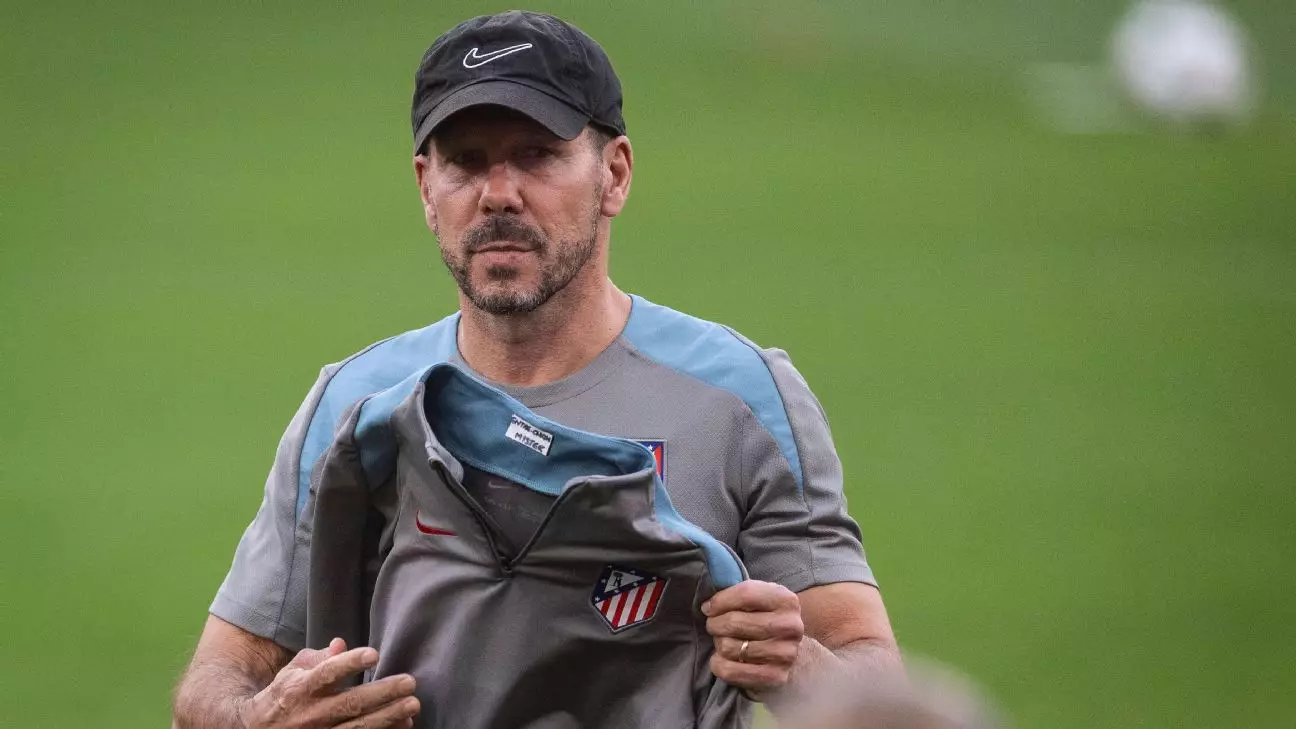The realm of professional football is no stranger to passion and emotion, particularly during tense rivalries such as the Madrid Derby between Atlético Madrid and Real Madrid. However, the recent incident at this highly charged match, where objects were thrown at visiting goalkeeper Thibaut Courtois, catalyzed a vigorous debate on the responsibilities of players and the expectations of fans. Atlético Madrid’s manager, Diego Simeone, found himself at the epicenter of this controversy, articulating a perspective that reflects a broader tension within the sport about fan behavior and player conduct.
In a post-match interview, Simeone expressed a sentiment that reverberated throughout the football community: players who provoke spectators should be held accountable. His comments seemed to lay a degree of blame on Courtois, suggesting that actions like celebrating in front of hostile fans could incite negative reactions. This assertion has not only sparked critique from various factions of football but also indicates a deeper issue at hand—how responsibility is shared between players and fans during intense moments of the game.
Simeone insisted that players must exercise control and be aware of the impact of their actions. His approach, while seemingly protective of the sport’s integrity, raised eyebrows regarding its implications. The dual responsibility suggested—that both players and fans contribute to the environment—can be seen as a slippery slope, where accountability becomes diluted in the face of emotional and irrational responses.
The derby itself was suspended due to the chaotic atmosphere created when Atlético ultras, the passionate and often unruly fan base, targeted Courtois after a Real Madrid goal. This response has led to significant ramifications, including a temporary halt in play and a necessity to address the unruly behavior publicly. Atlético Madrid’s disciplinary measures, which include banning individuals responsible for the misconduct, reflect an organizational effort to quell the situation and restore the club’s image.
Despite taking measures to rectify the issues raised, the effectiveness of banning individuals engages a larger debate regarding the systemic issues present within fan culture in football. It begs the question: what measures can be taken to deter such behaviors in the future? While punishing individuals is essential, it addresses only the symptoms rather than the root causes of fan aggression. A cultural shift is necessary within stadium atmospheres, promoting respect and understanding while retaining the fervent passion that defines football.
In the aftermath, Simeone faced substantial backlash for his remarks, which were perceived by many as an attempt to deflect responsibility from the violent actions of the fans. He later addressed this, asserting that he was misinterpreted, yet remained unflinching in his original opinions. His refusal to shift his narrative showcases his dedication to his philosophy on respect within the sport, albeit with significant risks in terms of public perception.
Moreover, Simeone’s claims that “many are represented in that situation” highlight a compelling element of collective sentiment among fans and players alike—that the line between celebration and provocation can be perilously thin. By fostering an open discussion about accountability in football, Simeone inadvertently shines a light on a pervasive issue; yet, whether this is productive or merely a distraction from addressing fan violence is up for debate.
The incident during the Atlético Madrid vs. Real Madrid derby serves as a microcosm of the broader challenges facing football today. As passion and hostility collide within the stadiums, the call for accountability and respect becomes essential. Both players and fans must navigate the complexities of their relationship, recognizing the weight of their actions.
While punitive measures are crucial to address immediate acts of violence, clubs must also strive to cultivate a culture of respect among their supporters. This involves creating campaigns that acknowledge the importance of sportsmanship and the consequences of provocation. Ultimately, only through a concerted effort can football hope to mend the divide between emotion and respect, ensuring that matches remain thrilling without devolving into chaos.

